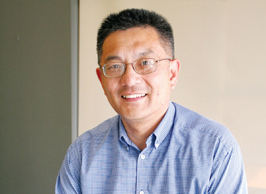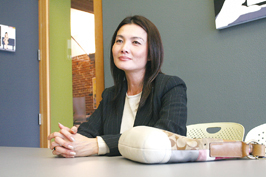home | metro silicon valley index | news | silicon valley | news article

Photographs by Felipe Buitrago
Raw meat: District 4 candidate Kansen Chu is the target of new allegations, for which he has demanded an apology.
Mud Wrestling
New accusations in the District 4 race highlight how it's become about everything but the issues
By Matt Stroud
IN March's special election, eight candidates squared off for the City Council seat left vacant by Mayor Chuck Reed last November. There was a bit of controversy when Reed endorsed Hon Lien—a Vietnamese Republican, entrepreneur and relative political newbie—over Kansen Chu, a Taiwanese–born Democrat well-connected in San Jose politics. The election was close enough to force a June 5 runoff election—Chu received 2,952 votes (31 percent), and Lien received 2,356 (24.74 percent).
It's been downhill from there. In fact, it's become one of the most bizarre campaigns in recent memory, as two candidates who seem in over their heads have made it about everything but the biggest issues facing District 4—especially complicated development issues stretching from Alviso to Coyote Valley and all along the hillsides, which have been the center of a push by homeowners for a substantial expansion of city services.
The campaign has been weak on issues, but one thing it has not been is boring. The latest twist came two weeks ago, when Hon Lien's campaign sent out a mailer outlining more than 160 health code violations filed against Kansen Chu's Ocean Harbor Restaurant between 1990 and 1994. It also stated that 10 tax liens had been taken out against Chu—a charge that turned out to be partially false, and led to somewhat of a political fiasco. Five of the liens were actually held against a previous owner of Ocean Harbor Chinese Restaurant (before Chu took majority control in 1989).
Chu's campaign staged a press conference outside City Hall, demanding an apology. A day later, as requested, Hon Lien sent a letter apologizing for the error, promising to send out an apology mailer. And yet, two days later, a mailer was sent to District 4 residents from Kansen Chu's campaign with another demand for an apology.
Nor did Chu publicly respond to the health code violations—and some of them were really nasty.
On Nov. 15, 1990, for example, cockroaches were present in food storage and preparation areas. And this happened again and again—over nearly five years, Ocean Harbor Restaurant couldn't seem to take care of their cockroach problem. Raw meats and poultry were commonly stored above foods and produce. Cooks were caught by health inspectors smoking cigarettes while preparing food; sweet and sour sauce was stored in a container labeled "PRISM General Purpose Cleaner"; a dishwasher failed to reach optimum temperature during a washing cycle; dead insects were commonly found in food preparation areas; partially cooked chickens and ducks were being stored uncovered at room temperature; raw meat was often left sitting out, juices from partially cooked meat dripped into marinade, and uncovered containers of food were commonly stacked on top of each other in the walk-in refrigerator, and so on.
Chu tells Metro that he wasn't managing the restaurant during much of its operation, and that "it's very hard to run a restaurant, and cockroach problems are very common."
But maybe not that common. Richard Fuchs, division director for the Consumer Protection Division at San Jose's Department of Environmental Health, was floored by the violations, and surprised that Ocean Harbor wasn't shut down before 2000.
"The presence of live roaches would definitely result in an automatic closure today," he says. "Certainly the issues of improper food temperature and using hand—washing sinks for food preparation would cause some kind of serious disciplinary action—possibly closure."
If this seems like ancient history, what may be far more relevant to the campaign is that Chu spent more than $30,000 in court fees settling the violations, and yet was able to wrangle a contract to run the Harbor Express Restaurant in Norman Y. Mineta San Jose International Airport. Both Chu and his wife, Daisy, have donated to political campaigns like Nora Campos' City Council bid, Cindy Chavez's mayoral campaign and Nancy Pyle's City Council campaign. Not to mention that he's being actively supported by the South Bay Labor Council, and Chavez. Despite denial from Chu, sources say that he's been courting councilmembers and proving inexpensive catering to many labor-friendly members of the council for years.
This isn't to say that Hon Lien is squeaky clean. She's listed on Sunnyvale Seafood's website as being the CFO, but she's not on the business license because she sold out in 2004 to start the financially doomed Golden Phoenix supermarket. Her business history includes a serious corporate bankruptcy for that supermarket, a half–million dollars in known debts and a fundamental cloudiness on the issues she hopes to address in District 4. She is aggressively pro–business, and lists free market zoning and affordable basic services as her two top issues. She says it's vital not to allow commercial rezoning for Coyote Valley "until we know that there's jobs."
However, her central campaign pitch doesn't have much to do with the issues themselves.
"You want to have somebody there that's honest," she says. "There are businesses that I've opened, and most of them were successful, and one failed. I'm here for the people in San Jose. I will represent the people. I'm not here because of personal interests. I'm here because I love San Jose, and I love the people."
Chu is also running on the issue of affordable basic services like garbage collection. He also says the "unique characteristics of Alviso and Berryessa" need to be maintained in the face of high–density growth, through the use of task forces to regulate zoning issues. But still, his central campaign is oddly personal rather than political.
"I have more experience, and a stronger commitment to our community and out city," he says. "Nobody asked me to run. Nobody hand–picked me to be a City Council member. This is my passion. I came to this country with $200 in my pocket and my passport. I was a very, very poor man. And I've been successful. And so now I want to give back to the community."

Painted red: Chu's opponent Hon Lien says the race's controversy over Communism has threatened the safety of her family.
Better Dread Than Red
In terms of the campaign's odd twists, however, none of this can touch the communist issue. On the night of the March special election, Victor Ajlouny, longtime San Jose political consultant and Hon Lien's current campaign manager, was asked about communism and its role in this election. His response was "the Cold War is over. Leave it alone." And that seemed about right. But it still hasn't died.
And it's local activists like Dr. Phu Le who keep it alive. A month ago, people began saying he had gone mad. Le—a physically small, thin Vietnamese man with glasses and a sparse moustache who goes by Patrick in English-speaking circles—was literally throwing punches at members of the local Vietnamese community because their political beliefs didn't mesh with his. A police report described battery charges against Le for an incident at San Jose Airport on April 7, during a "Welcome back Ly Tong event." At the event, Le purportedly assaulted a photographer because he assumed the photographer was a communist spy. Le's statement says he saw "a known communist taking his picture ... [and was] in fear for his family located in Vietnam."
The photographer, Tan Nguyen, who received a facial bruise and a cut on his hand, insisted during and after the fact that he is not a communist, but rather a member of the local Vietnamese press corps. He said he was simply trying to get a photo of one of Vietnam's most famous and most-revered anti–communist activists, Ly Tong. In his statement, he also stated that, after Phu Le attacked him to the ground, he was kicked and punched by a group of others he couldn't identify. The case is pending.
Phu Le refused to talk about the case on the advice of his lawyer, but concedes, though, that his organization, the Vietnamese American Committee, is very strongly anti–communist.
"We will do whatever we need to do to stop them," he says.
The campaign first developed its red–baiting tone because Bryan Do, a 32–year–old businessman, and one of eight candidates in the March 6 election, made it a focal point of his campaign. He intimated that, since Hon Lien owns a business called L & D Enterprise in Ho Chi Minh City, she must be pro–communist, and therefore against the core values of many in the local Vietnamese community. And shortly thereafter, an advertisement in the Feb. 16 edition of the Viet Tribune was credited to "Friends of Hon Lien"—not officially endorsed by the political candidate—comparing Bryan Do to a communist prison guard, accusing him of shoving aside a 7–year–old in callous haste.
Do quickly threatened suit, but the attacks went on. This was when the mudslinging started to move away from straight politics, and toward general mayhem, closer to tabloid sensationalism than one might expect in a city council election like this one.
Do recently announced his endorsement of Kansen Chu, and three months later, communism is still an issue in this race. Why?
Jean Libby, editor of the Palo Alto–based Viet-Am Review online, says that many Vietnamese Americans have escaped Communist Vietnam in the face of great peril, especially the "Boat people"—a term that came into common use during the late 1970s with the postwar, mass departure of Vietnamese refugees from communist-controlled Vietnam. More recently, she says, the escape has been easier—the Vietnamese-American population is growing, and more immigrants have stronger connections here—but in many cases, first–generation Vietnamese–Americans share a very tragic history, in narrowly escaping communist Vietnam with their lives. So, she says, it remains a serious issue, despite how backward–looking it must seem to many Americans.
"The present government of Vietnam is corrupt," Libby says. "And the Vietnamese people believe that [the Vietnamese government] should not be trusted under any circumstances, and, despite Vietnam's status as a WTO country and whatever George Bush wants to proclaim regarding the legality of business in Vietnam, they're still cracking down on political activity within Vietnam, and arresting dissidents and anybody who criticizes the government, and shutting down Internet sites. And so when they see a candidate who is doing business in Vietnam—someone who is rich, and with influence, like Hon Lien—they see that as supporting the communist government. And that's not acceptable."
And while Bryan Do says he's trying hard to separate himself from the communist issue, his thoughts concur with Libby's. "Clearly, communism is a factor in this race," Do says. "Clearly, anyone with a strong relationship with the government of Vietnam causes emotions to run extremely high. Most people, though, when I spoke to in excess of a thousand people [in District 4] ... stated that it was one of their top five issues, and for some people it was their top one."
Lien, says the fervor over the issue has come with a price—she prefers never to leave her kids alone, for fear that someone with an anti-communist agenda might try to harm them.
And none of this is new for San Jose politics, either. In the District 7 race in 2005, Madison Nguyen, the Vietnamese candidate who eventually won, was shot at with an air rifle. She avoided harm—the pellet shattered her rear car window and nothing more—and downplays the incident today. But she admits that she sympathizes with Lien.
"It made me think about whether I really want to do this," Nguyen said. "I wish her well."
Send a letter to the editor about this story.
|
|
|
|
|
|